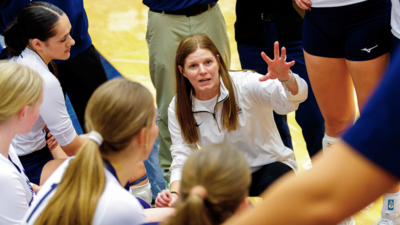Coaching Through a Christian Lens

Coaching is more than the execution of strategy, the refinement of skills or the pursuit of championships. It is a relational and formative role, one that significantly influences the lives of athletes both on and off the field. Through a Christian lens, coaching becomes a calling marked by service, humility and a commitment to developing individuals not only as athletes but as people made in the image of God.
A Higher Calling
For the Christian coach, the work is vocational in nature. It stems from a belief that every task, from managing a practice to mentoring an athlete to preparing a game plan, can be done in service to God. As Colossians 3:23 reminds us, “Whatever you do, work heartily, as for the Lord and not for men.” This perspective transforms coaching into an act of stewardship and discipleship.
Rather than focusing solely on performance outcomes, Christian coaches are called to prioritize long-term development and spiritual formation. Wins and losses still matter. But they come second to the growth of character, perseverance and purpose.
Relationships That Reflect Christ
Jesus’ ministry provides a model of relational leadership. He invested deeply in His disciples, walked alongside them in everyday life and nurtured their growth. Christian coaching similarly emphasizes meaningful, trust-based relationships between coaches and athletes.
Such relationships require consistent presence, careful listening and an ability to see beyond the athletic identity of each individual. By recognizing every athlete as a unique creation of God, coaches can offer guidance that respects both the person and the performance. These daily moments of challenge, encouragement and support become opportunities to demonstrate the grace and truth of Christ, even when faith is not discussed explicitly.
Leadership Rooted in Christlike Character
Athletics often celebrates competitiveness, assertiveness and personal achievement. However, Christian leadership in coaching takes a different path. Philippians 2:3–4 provides a countercultural framework: “Do nothing from selfish ambition or conceit, but in humility count others more significant than yourselves.”
This type of leadership is not passive; rather, it is firmly grounded in the example of Christ. It appears when a coach leads with fairness, admits mistakes, models forgiveness and treats every team member with dignity, regardless of status or skill. Athletes influenced by such leadership gain more than improved athletic ability; they learn valuable lessons in character and faithfulness that will shape their futures far beyond the athletic arena.
Navigating Pressure with Purpose
The coaching profession carries high expectations. From administrators and parents to communities and teams, the pressure to succeed can be relentless. Coaches working from a Christian foundation are equipped with spiritual practices that provide clarity and renewal. Time in prayer, Bible study and connection with fellow believers becomes essential for sustaining purpose and avoiding burnout.
Christian coaches are encouraged to regularly examine their motivations and goals. When the primary aim is aligned with glorifying God and serving others, the weight of worldly pressure is diminished. Coaching becomes not just a job, but a way of participating in God’s work of transformation in the lives of young people.
Preparing Coaches for Impact
Christian coaches require both technical training and spiritual grounding. Concordia University, Nebraska’s Master of Science in Athletic Coaching program equips coaches to excel in their profession while anchoring their practice in Christian values. This fully online program blends the latest research in sport science and coaching methods with a framework of ethical leadership and servant-based philosophy.
Coursework includes topics such as athlete development, coaching leadership, team dynamics, psychology and character formation. The program challenges students to think critically about the role of a coach, the influence of sport in society and the ways faith can inform professional practice. Graduates emerge not only as knowledgeable coaches but as leaders who understand the lifelong impact of their vocation.
Christian coaching is demonstrated in everyday choices, quiet acts of integrity and the courage to lead differently. Through a Christ-centered approach like that of Concordia University, Nebraska’s Master of Science in Athletic Coaching program, coaching can become a ministry of presence, excellence and eternal impact.
Interested in Concordia University, Nebraska's Master of Science in Athletic Coaching?
Related Stories


